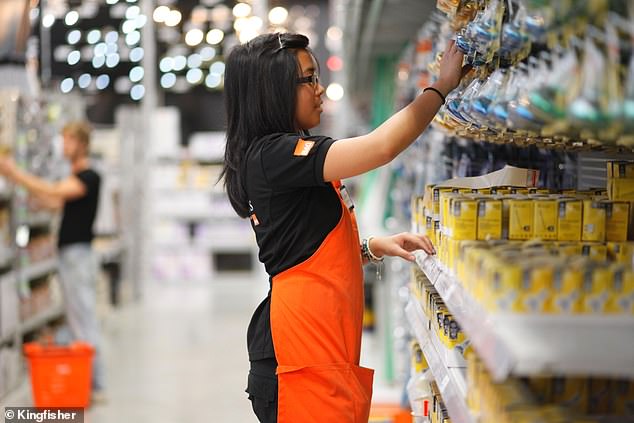- Kingfisher revealed that adjusted pre-tax profits fell 25.1% to £568.1 million
- The FTSE 100 company operates Castorama and Brico Depot in France
<!–
<!–
<!– <!–
<!–
<!–
<!–
Kingfisher’s profits fell by a quarter last year due to subdued activity in the home improvement sector.
B&Q’s parent company announced that adjusted pre-tax profits fell 25.1 percent to £568.1 million in the 12 months ended January, following weaker results in France and Poland.
The group has also cut its profit expectations for the coming year, after lowering expectations for 2023 in November and September last year.
In France, where Kingfisher operates Castorama and Brico Depot, sales were hit by ‘low consumer confidence’ and poor weather conditions that affected purchasing of seasonal products.

Setback: Kingfisher reported a 3 percent decline in Q3 sales to £3.25 billion, but sales were still 15 percent higher on a two-year comparable basis
At the same time, like-for-like sales in Poland fell by 9.5 percent due to higher customer use of discounts and strong comparative performance last year in the electricity, plumbing, heating and cooling category.
Higher salary, energy and technology costs in all major territories, including Britain and Ireland, also negatively impacted Kingfisher’s revenues.
The FTSE 100 group achieved modest like-for-like sales growth in the British Isles of 0.8 percent thanks to resilient e-commerce sales and increased demand from trade customers at Screwfix.
However, revenues were dampened by adverse weather conditions, lower demand for core and big-ticket items and a weaker performance in the second half.
Kingfisher CEO Thierry Garnier said the company was “cautious about the overall market outlook for 2024 due to the lag between housing demand and home improvement demand.”
As a result, the company expects adjusted pre-tax profits to fall further this financial year to between £490m and £550m.
Like other DIY retailers, Kingfisher benefited significantly as Covid-19 restrictions encouraged homeowners spending more time indoors to spruce up their living spaces.
Trade was also boosted by a temporary stamp duty holiday and a growing desire among Britons for larger living spaces.
Growth slowed as people started working from home less and socializing more regularly with family and friends, but also as inflationary pressures rose and central banks raised interest rates.
Mark Crouch, analyst at eToro, described the group’s latest results as “worrying” and marks the retailer’s third profit warning in the past six months, “with consumers putting aside their DIY home improvement plans, Kingfishers profits are being undermined’.
Kingfisher Shares were 2.1 percent lower on Monday morning at 228.2 pence, making them the biggest faller on the blue chip index. Their value has fallen by about 10 percent over the past twelve months.
Crouch added: Performance in Britain and Ireland provided some reassurance for investors, with B&Q, TradePoint and Screwfix all delivering modest sales and market share growth.
‘To this extent, the DIY retailer continues to expand its Screwfix stores across all regions, in a bid to capitalize on the success of the popular brand.
‘Rate cuts can’t come soon enough for Kingfisher, which like the housing market is in trouble and struggling to achieve any growth.
‘While the company has maintained positive cash flow and an attractive dividend, investors will be all too aware of the company’s declining profits – which, if continued, will increase pressure on margins and threaten future returns to take.’
